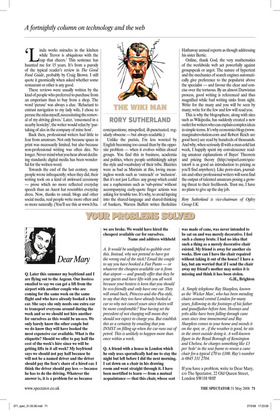‘ L inda works miracles in the kitchen while Trevor is ubiquitous
with the cup that cheers.’ This sentence has haunted me for 15 years. It’s from a parody of the typical reader’s review in The Good Food Guide, probably by Craig Brown. I still quote it gnomically when asked whether some restaurant or other is any good.
These reviews were usually written by the kind of people who preferred to purchase from an emporium than to buy from a shop. The word ‘peruse’ was always a clue. ‘Reluctant to entrust navigation to my lady wife, I chose to peruse the atlas myself, necessitating the removal of my driving gloves.’ Later, ‘ensconced in a nearby hostelry’, the writer would relax by ‘partaking of ales in the company of mine host’.
Back then, professional writers had little to fear from amateurs. Not only because space in print was necessarily limited, but also because non-professional writing was often dire. No longer. Never mind what you hear about declining standards; digital media has been wonderful for the written word.
Towards the end of the last century, many people wrote infrequently; when they did, their writing took on a kind of awkward ceremony — prose which no more reflected everyday speech than an Ascot hat resembles everyday dress. Now, thanks to email, blogs and other social media, real people write more often and so more naturally. (You’ll see this at www.b3ta. com/questions; misspelled, ill-punctuated, regularly obscene — but always readable.) Unlike the purists, I’m less worried by English becoming too casual than by the opposite problem — when it evolves within closed groups. You find this in business, academia and politics, where people unthinkingly adopt the style and vocabulary of their tribe. Blairites were as bad as Marxists at this, loving meaningless words such as ‘outreach’ or ‘inclusion’. But it’s not just Lefties: any group which could use a euphemism such as ‘sub-prime’ without accompanying curly-quote finger actions was asking for trouble too. It’s why, to avoid lapsing into the shared-language and shared-thinking of bankers, Warren Buffett writes Berkshire Hathaway annual reports as though addressing his sister Bertie.
Online, thank God, the very mathematics of the worldwide web act powerfully against groupspeak or argot. The nature of hypertext and the mechanics of search engines automatically give preference to the popularist above the specialist — and favour the clear and concise over the tortuous. By an almost Darwinian process, good writing is referenced and thus magnified while bad writing sinks from sight. Write for the many and you will be seen by many; write for the few and few will read you.
This is why the blogosphere, along with sites such as Wikipedia, has suddenly created a new outlet for writers who can explain complex ideas in simple terms. It’s why economics blogs (www. marginalrevolution.com and Robert Reich are good here) are read by hundreds of thousands. And why, when seriously ill with a man-cold last week, I happily spent my convalescence reading amateur explanations of Bayes’ Theorem and pricing theory (http://snipurl.com/spectator8 is as good an introduction to pricing as you’ll find anywhere). Like porn-stars, journalists and other professional writers will soon find the output of talented amateurs posing a growing threat to their livelihoods. Trust me, I have no plans to give up the day job.










































































 Previous page
Previous page